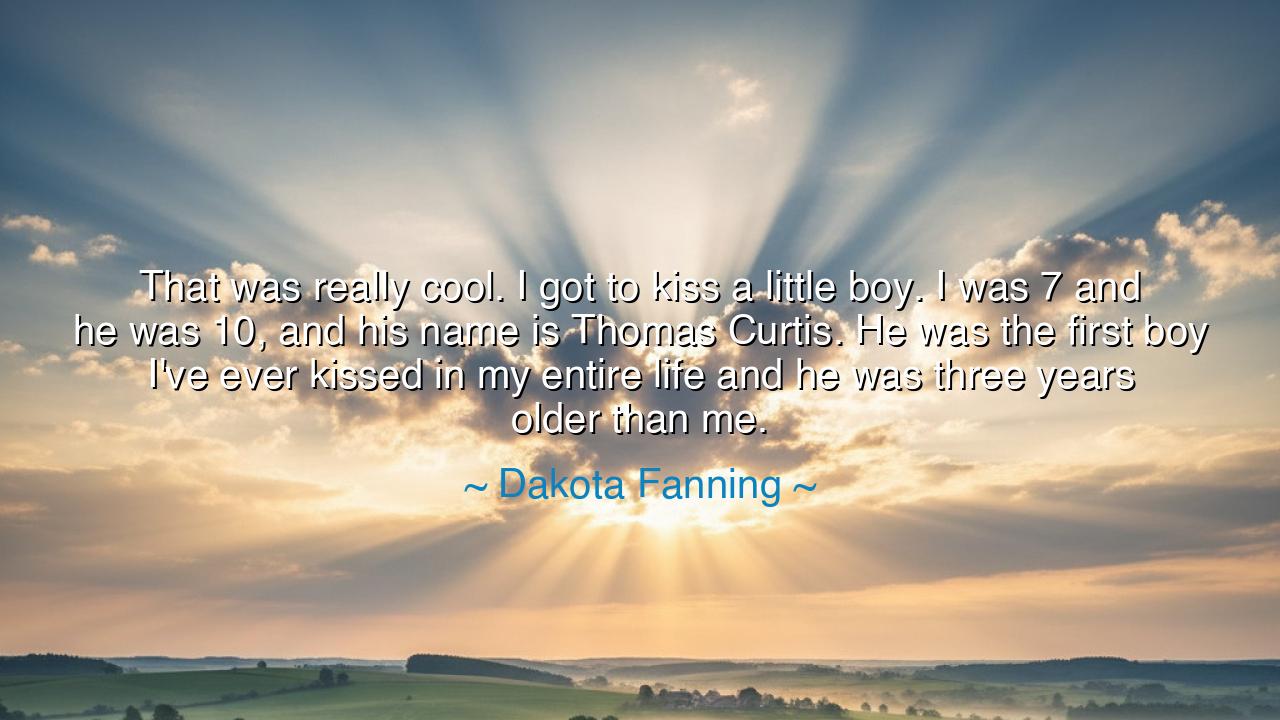
That was really cool. I got to kiss a little boy. I was 7 and he
That was really cool. I got to kiss a little boy. I was 7 and he was 10, and his name is Thomas Curtis. He was the first boy I've ever kissed in my entire life and he was three years older than me.






"That was really cool. I got to kiss a little boy. I was 7 and he was 10, and his name is Thomas Curtis. He was the first boy I've ever kissed in my entire life and he was three years older than me." These words spoken by Dakota Fanning are a lighthearted and innocent reflection on first experiences, particularly the first steps into the world of relationships and affection. In this statement, Fanning speaks to a moment in her early life when she experienced the small but significant milestone of her first kiss—an experience that many see as an introduction to the complex world of human connection, emotion, and growth. While this moment might seem simple, it captures the beginning of personal development and awareness of one's place within a larger social structure.
In the ancient world, such moments of emotional awakening were often seen as rites of passage. The Greeks, for example, placed great importance on the transition from childhood to adulthood, marking the moment when an individual began to understand not just their own emotions but their connections with others. The act of kissing in their culture was often symbolic—used to represent friendship, respect, or even romantic affection. It was an expression of the human condition, an outward gesture that signified the deepening of relationships. This early act of affection, while seemingly small, would have been seen as part of the process of becoming a full participant in the world of adult emotions and social bonds.
The story of Alexander the Great offers a fascinating parallel. Alexander, who by the time he was 20 years old had already begun to carve his place in history, experienced early connections with others that shaped his emotional and political development. Although his first relationships were marked by the pressures of leadership and destiny, his emotional experiences—including his relationship with his mother, Olympias, and his close bonds with his companions—were foundational to his understanding of power and human nature. Just as Fanning reflects on the first stirrings of affection, Alexander too had moments in his youth that would shape his understanding of leadership, loyalty, and love.
In a different but equally important sense, Queen Cleopatra of Egypt also navigated the realms of early relationships that defined her political and personal life. Her connections, particularly with powerful figures such as Julius Caesar and Mark Antony, were driven by strategic alliances, but they also reflected her understanding of personal relationships. These experiences helped define her as a ruler who was not only powerful but also capable of using her emotional intelligence to navigate complex political waters. Like Fanning’s innocent kiss, Cleopatra’s relationships were a part of a larger journey in understanding human connection, though they involved much more significant stakes.
The lesson in Fanning’s reflection is that first experiences, no matter how small they may seem, are foundational to our growth and understanding of the world. Just as the ancient philosophers emphasized the importance of personal development and the transitions from one stage of life to another, we too must recognize the value in early experiences. These moments shape how we approach future relationships and influence how we understand trust, affection, and emotional intimacy.
Furthermore, there is a universality to such experiences—whether the first kiss or the first encounter with love, human connection is one of the most powerful forces that drives us. Fanning’s reflection on her early life highlights the beauty of innocence and the purity of those first steps into the world of emotions. Similarly, the ancients celebrated emotional connection as part of the human experience, understanding that growth in this realm was as vital as any physical or intellectual achievement. Just as they valued friendship and love as key aspects of a flourishing life, we too must recognize the value of these early, formative experiences in building our emotional landscapes.
Finally, let us take action by embracing the innocence and purity of our early experiences, allowing them to guide our future relationships. Just as Fanning reflects on a simple, yet significant moment, we can appreciate how our own first experiences shape our emotional intelligence and our connection to others. Whether it is in love, friendship, or partnerships, each step we take towards deeper understanding and empathy should be celebrated as a part of our journey toward becoming whole. Let us continue to be open to growth, learning, and compassion as we navigate the complex and beautiful world of human relationships.






AAdministratorAdministrator
Welcome, honored guests. Please leave a comment, we will respond soon